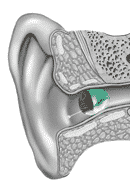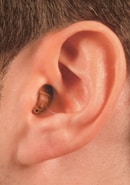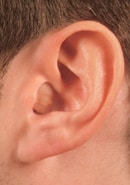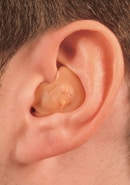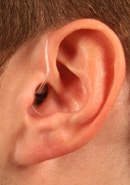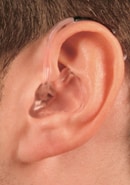Hearing Aid Styles
What Hearing Aid Styles Are Right for You?
There are many different hearing aid styles, ranging from completely-in-the-canal to behind-the-ear hearing aids. When people in Lenoir City, TN, need help choosing the right one, East Tennessee Audiology is there to assist them. We provide professional hearing aid services and insights to ensure that people love their new hearing aid.
Analog vs. Digital Hearing Aids
Hearing aids come in two types: analog and digital. Both options make use of the same mechanisms to transmit sound waves to the brain. That includes a microphone, amplifier, and speaker.
Analog hearing aids make sound waves louder. The microphone perceives sound from the environment and converts it into electrical waves. The amplifier sends those waves through the speaker at a higher volume.
Some analog models have a microchip that lets audiologists program them for different environments. That way, users can enjoy the ambiance of a library or a noisy restaurant with friends. Analog hearing aids, like their digital counterparts, can store multiple settings.
Digital hearing aids perform the same functions as analog models but convert sound into electrical impulses. The internal computer chip translates sound into a code, allowing for superior performance and precision. Digital hearing aids have a wide range of programmable settings and can reduce background noise.
Types of Hearing Aids
In-The-Ear Styles
Hearing aids worn in the ear are usually custom-fit, based on a cast or impression of the ear. They’re available in different skin tones to camouflage with the outer ear. There are several styles – each is listed below, ranging from smallest to largest.
IIC hearing aids are the smallest option on the market. They sit out of sight in the second curve of the ear canal. This hearing aid benefits individuals with mild or moderate hearing loss.
CIC hearing aids fit discreetly inside a person’s ear canal. They’re among the smallest and most noise-resistant models and cater to individuals with mild to moderate hearing issues. CIC hearing aids have a short battery life due to their compact batteries.
An in-the-canal (ITC) hearing aid requires a custom fit with a narrow tube that goes directly into the ear canal. The device has features that don’t fit on smaller CIC models and works for moderate hearing loss. ITC hearing aids may clog due to excess earwax.
In-the-ear (ITE) hearing aids come in two varieties. One option fills the outer ear, while the other occupies the lower portion. These aids help with all degrees of hearing loss, thanks to directional microphones that pick up surrounding sounds. ITE models also have long battery lives and are easy to adjust.
Behind-The-Ear Styles
Behind-the-Ear (BTE) models sit behind or on top of the outer ear, with tubing that routes sounds down into the ear that connects to an ear tip or earmold to secure them in the ear canal. BTEs come in colors to blend with hair or skin tones, and even chrome colors, leopard print and other funky designs to suit personal styles. Different BTE sizes accommodate different features, controls, battery types and degrees of power (larger instruments generally have more power than smaller ones). While many people choose discreet BTEs that are unnoticeable when worn, others are tempted to show off the cool designs.
The RITE hearing aid, also known as a receiver-in-canal (RIC) model, mirrors the behind-the-ear model. The difference is that it uses a tiny wire instead of tubing to connect to the speaker. This hearing aid is less noticeable than other options but may clog due to earwax.
Behind-the-ear (BTE) hearing aids go around a person’s ear. The tubes slide into the ear canal to amplify sound. While the traditional BTE hearing aid is bulky, some manufacturers offer a mini BTE. This hearing aid comes with rechargeable batteries and directional mics.
This open-fit hearing aid with an earmold secures the speaker inside the ear canal. The rest of the unit rests behind the ear. The BTE hearing aid is ideal for people of all ages and degrees of hearing loss.
Call us at (865) 816-6525 to schedule your hearing test appointment today.
Factors to Consider When Choosing a Hearing Aid
Not all hearing aids are equal. Neither are all people’s degrees of hearing loss. It’s crucial to get a proper hearing test and diagnosis before selecting a style of hearing aid.
Nearly 50 million Americans experience mild to severe hearing loss. The most benign conditions include mild to moderate hearing loss, requiring people to talk louder or more clearly to be heard. Severe or profound hearing loss forces individuals to rely on lip reading and sign language to communicate with others.
Hearing aids range in complexity from basic to advanced. A small, highly advanced hearing aid might work for someone with mild to moderately severe hearing loss. However, if you have visual or dexterity issues, the device will be hard to use.
Other factors to consider include:
- Lifestyle
- Skin sensitivities
- Medical conditions
- Cosmetics
- Budget
- Power requirements
An expert audiologist at East Tennessee Audiology can help you find the right device for your type of hearing loss. We offer models with directional microphones for superior hearing in noisy situations and wireless options that adjust automatically. We even have hearing aids that cancel feedback and unwanted noise.
Put an End to Hearing Loss
At East Tennessee Audiology, we’re here to restore your ears to their normal hearing ability. Our friendly team of expert audiologist looks forward to guiding you through the different styles of hearing aids and finding the right match for your hearing needs. Schedule your appointment by calling us at (865) 816-6525 or visiting us in Lenoir City, TN, today.
Book Your Free Hearing Consultation
For more information or to schedule service, call us at (865) 816-6525 or fill out the form below.

Still Unsure About Choosing A Hearing Aid?
We understand that there are many hearing aid types to choose from. In fact, at times it can be overwhelming to select from many hearing aid styles! That’s why we offer a FREE hearing consultation for you to explore all of our options.

